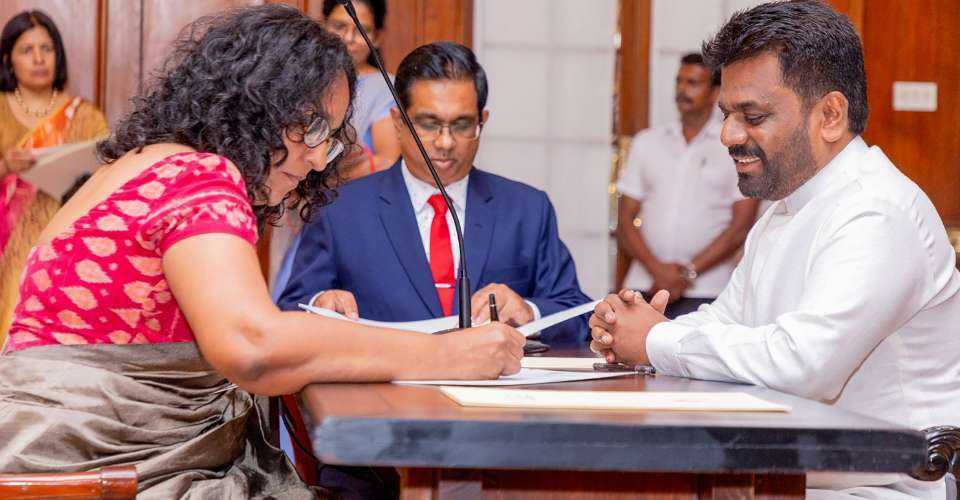
Prime Minister Harini Amarasuriya (left) with President Anura Kumara Dissanayake (right) in Colombo on Sept. 24. (Photo: AFP)
Media watchdogs have urged the new Sri Lankan government to repeal repressive laws that limit freedom of expression and set up a presidential panel to probe the killings of journalists in the island nation.
The new government of President Anura Kumara Dissanayake should abolish laws that “limit freedom of speech and expression guaranteed under the constitution,” enacted by the previous government of Ranil Wickremesinghe, said Hana Ibrahim, convener of the Free Media Movement.
The government should establish a presidential commission to investigate the disappearances and killings of journalists, Ibrahim demanded in a statement on Sept. 28.
“We urge the president to reinforce democratic values,” Ibrahim told President Dissanayake, who won the presidential polls on Sept. 21.
The Wickremesinghe government passed the repressive Online Safety Act (OSA) despite strong domestic and international criticism in February.
The draconian law gives government-appointed panels broad powers to remove “prohibited” online content.
Social media played a key role in the Aragalaya (struggle) protests during the foreign exchange crisis in 2022 which ousted the then president, Gotabaya Rajapaksa, whose shoes Wickremesinghe stepped into in May of the same year. Left-leaning Dissanayake became prominent during the nationwide protests.
In January, justice minister Wijeyadasa Rajapakshe presented the much-criticized Anti-Terrorism Bill to replace the longstanding Prevention of Terrorism Act (PTA). The new law allows the authorities to arbitrarily detain people and hold them in detention without charges.
Colombo-based Christian journalist Ruwini De Soiza demanded the immediate repeal of these laws.
As soon as these bills were tabled in parliament, “there were serious disturbances,” but the government of Wickremesinghe went ahead and passed them, Soiza told UCA News.
According to media reports, 34 journalists and mediapersons have been killed since Wickeramasinge government was formed.
Over the last decade, there have been over 200 recorded attacks on journalists and media institutions. Reporters Without Borders (RSF) ranked Sri Lanka 150th on its World Press Freedom Index in 2024.
Lasantha Wickrematunge of the Sunday Leader was killed in 2009 after he exposed a corrupt arms deal by Rajapaksa who acted as the Indian Ocean nation’s defense secretary. He was assassinated in broad daylight on a public road, a few hundred meters from a security checkpoint.
Journalist Prageeth Ekneligoda disappeared in 2010 after reporting on nepotism and corruption within the family of former President Mahinda Rajapaksa.
Sirin Fernando, who worked with Wickrematunge and Ekneligoda, called for a thorough investigation to catch whoever was responsible.
“The culture of killing journalists needs to change in this country,” he told UCA News.
Wickrematunge’s daughter, Ahimsa Wickrematunge, appealed to the new president to reopen the investigation into her father’s internationally condemned assassination.
“The pain still lingers, but I remain resolute in my pursuit [for justice],” she said in a social media post.
source : uca news
